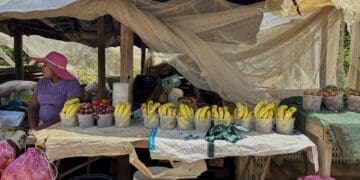A Western Cape–based company, Carmién–Bergendal Rooibos Tea, is entering the Chinese market after signing a Memorandum of Understanding (MoU) with ChanX Group at the China International Import Expo (CIIE) in Shanghai.
The agreement will allow Carmién Rooibos products to be imported and distributed across China, creating new opportunities for farmers, suppliers and small businesses in the Western Cape.
Rooibos is one of South Africa’s key agricultural exports, providing income and employment to approximately 8 000 workers across primary production, processing, packaging and retailing.
According to the Rooibos Council, production volumes have grown to around 22 600 tons in 2023, with total sales equivalent to more than 10 billion cups of the tisane. Rooibos is exported to over 50 countries, with Japan, France, Germany, the Netherlands and the United Kingdom among its largest markets.
Charl Rudman, International Sales Manager at Carmién said initial attempts to market Rooibos in China were difficult due to lack of awareness and high duties.
“Over 30% import duties were applicable at the time. The South African government, particularly the Department of Trade, Industry and Competition (DTIC) and other stakeholders worked to reduce duties to 7%, making re-entry into the market feasible,” Rudman said.
He added that the partnership with ChanX Group opens new avenues for Carmién in Asia.
“When the group mentioned the brand’s popularity in Japan and the potential of opening new market possibilities in China, and after several emails and discussions, a decision was made to proceed with changes to the packaging, including Chinese translations. The first order was placed earlier in the year, and the rest is history,” he said, highlighting the importance of multiple interactions in securing a bankable business deal.
The Carmién–ChanX partnership is expected to create significant opportunities for local SMEs and suppliers.
Lize du Preez, Director at Carmién Tea and founder of The Lize Mouton Collection (LMC), told Vutivi Business News: “50% of Carmién’s factory Bergendal Rooibos is owned by farm workers and would directly benefit from any increase in volumes sold. For additional branded products sold, we can also create more jobs in the packing facility at the factory.”
She noted that working with a Chinese partner could help overcome historical export challenges, including difficulties with export codes and exporter registration.
“This deal could make it easier for South African SMEs in the rooibos value chain to access international markets,” du Preez said.
China currently ranks as the 11th largest export market for Rooibos, accounting for only 3% of total production. “There is optimism about the potential for China to move up the list and become one of the top export markets for Rooibos tea within the next few years. Japan is currently the number one export market, followed by Germany,” Rudman said.
The expansion not only strengthens Carmién’s footprint in Asia but also benefits the Western Cape’s small business ecosystem. Increased production and packaging demand could create contracts for local suppliers, while the farm-worker ownership model at Bergendal ensures that economic gains are shared with local communities.
This partnership demonstrates how international trade agreements can support SME growth and contribute to inclusive economic development in South Africa.
olga@vutivibusiness.co.za































































